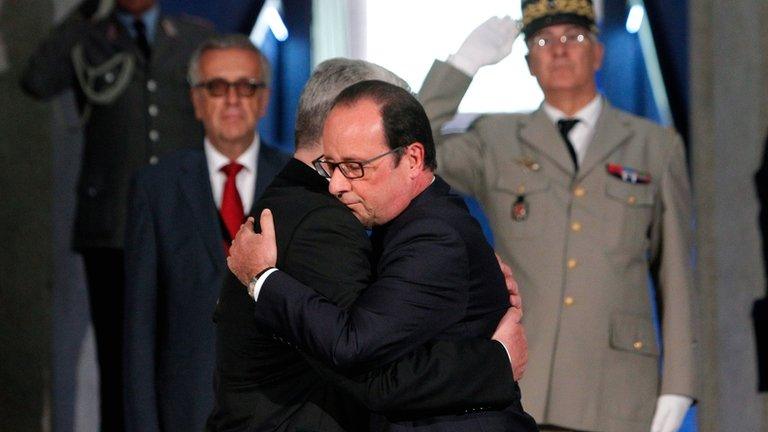World War One: Sporting stories of bravery recalled 100 years on
- Published
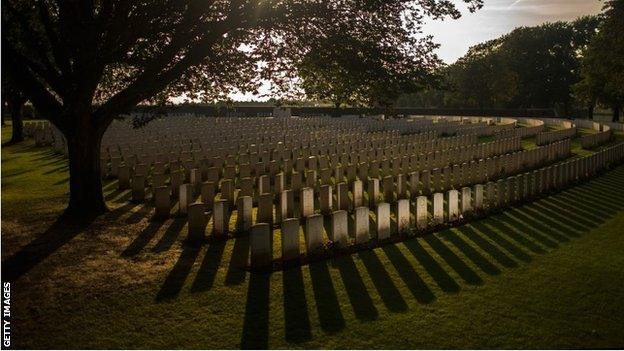
Monday, 4 August marks the 100th anniversary of the start of Britain's involvement in World War One
They were the sporting stars of yesteryear. Captains, team-mates, local heroes.
Many of them went from the playing field to the battlefields of World War One, never to return.
Monday marks the 100th anniversary of Britain's declaration of war on Germany.
It was at 23:00 on 4 August 1914 that Britain entered into one of the costliest conflicts in history, and the fighting continued until 11 November 1918.
Here, BBC Sport recalls some notable stories - from whole teams who joined the armed forces to a modern-day international inspired by his ancestors' wartime deeds.
Hearts and minds - the Tynecastle team spirit
A memorial plaque on a stand at the Tynecastle home of Heart of Midlothian Football Club remembers those who died in the First World War.
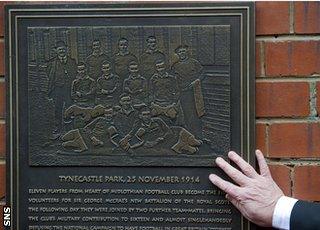
Seven Hearts first-team players were killed in action during World War One
Time may have ticked on, but the example set by the Hearts team has never been forgotten - players who put their lives on the line.
In the 1914-15 season, the club topped the Scottish League and were on track for the title, but pressure was growing on footballers to volunteer for the wartime effort. Some players, despite being bound by contracts to their clubs, were accused of cowardice by not fighting for their country.
On Wednesday, 25 November 2014, 11 Hearts players signed up en masse - volunteering for the new 16th Royal Scots Battalion, unofficially known as McCrae's Own after its founder and chief recruiter Sir George McCrae.
A total of 16 Hearts players enlisted, the catalyst for others to join from clubs including Raith Rovers, Falkirk, Dunfermline, East Fife and Hibernian. Hundreds of supporters followed.
In England, players from Clapton Orient - the club which later became Leyton Orient - also signed up together.
Comfort parcel |
|---|
In 1916, as the horror of war set in, Hearts officials sent out a parcel to McCrae's Battalion. It contained 240 pairs of socks, 5,000 cigarettes, 20 cases of soap, 100 boxes of Edinburgh rock, 14 pairs of football boots, three balls and a pump. |
Three Orient footballers lost their lives and seven Hearts first-team players were killed in action. Few of the remaining survivors ever wore the Scottish side's maroon jersey again, but their actions are still remembered.
"The bravery of these men is something we have always been proud of," Hearts historian David Speed told Britain's Great War programme earlier this year.
"Seven first-team players died during the war, including centre-forward Tom Gracie who hid a diagnosis of leukaemia so he could continue training for battle.
"The team took over two decades to recover, both emotionally and in terms of strength."
Mobbs & Tull - Northampton's finest
When Northampton rugby club take on the Barbarians in the annual Mobbs match, the players are honouring one of the town's most famous sons.
Standing at more than 6ft tall, Edgar Mobbs was the Saints skipper for six seasons. He showed his leadership qualities on the war front too.
Mobbs formed his own special corps and 400 men volunteered to join him for what became known as the Sportsman's Battalion, which formed part of the Northamptonshire Regiment.
Amid the chaotic mix of bullets, dust, smoke, and adrenaline, Lt Col Mobbs paid the ultimate price at the Battle of Passchendaele as he personally attacked a machine gun post.
He had already been wounded three times in the war, and finally went down after being shot through the neck. As he lay dying, he passed the map reference of the enemy to a runner.
The pipes of peace |
|---|
In December 1914, the "Christmas truce" football game took place where the war came to a temporary halt for a match between German and Allied troops. |
Less than a mile from the rugby stronghold of Franklin's Gardens is Northampton Town's Sixfields football stadium, which has Walter Tull Way running behind it.
Walter Tull, who played inside forward for Tottenham before joining the Cobblers, was the first black outfield footballer in England's top flight - and he made history in wartime too.
"His Dad was from Barbados and his mum was from Kent. When war was declared, he signed up for the footballers' battalion of the Middlesex Regiment and served on the Western Front," said Tony Collins, a professor of sport history at Leicester's De Montfort University.
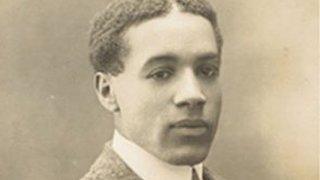
Walter Tull made history as both a footballer and Army officer
"In 1917, he was commissioned as an officer, which was extraordinarily unusual. He was the first black officer in the British Army."
It was a remarkable rise for Tull - the grandson of a slave - who was brought up in an orphanage after his parents died and was subjected to racists taunts at football matches.
Tull suffered shell shock in the Somme, and died aged 29 when struck by a single bullet as he led an attack on the Western Front.
Some of his men made several attempts to bring Tull back to the British trenches, but his body was never recovered.
Football pioneers - the female munition workers
While Britain's men fought in France and elsewhere, the women stepped into crucial roles at home. Thousands took dangerous jobs in munition factories and sport offered a diversion and some healthy activity.
They worked long hours, often in poor conditions and with dangerous chemicals. The so-called 'canaries' were women who worked with TNT, which gave them toxic jaundice and turned their skin yellow.
Against this background, women's football sides sprang up, with the Munitionettes Cup' attracting 30 teams in the North East of England.
One player stood out. Bella Reay scored 133 goals in a season for Blyth Spartans Ladies FC, who went unbeaten for two years after being taught to play by navy lads on the beach.
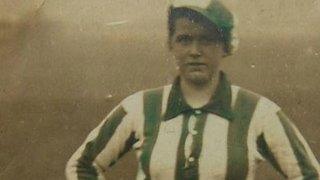
Bella Reay averaged better than three goals a game, and scored a cup final hat-trick
Reay scored a hat-trick in the cup final when her side beat Bolckow-Vaughan of Middlesbrough before a 22,000 crowd at Ayresome Park in 1918.
"From 17 to 20, she played football, including for England. She scored 101 goals from 32 games, which was the best ever," recalled her grand-daughter Yvonne Crawford.
"She played at Newcastle United and Wembley. I think if it had been this day and age, she'd have been worth a fortune."
Such was the enthusiasm for the game that on one occasion, Blyth winger Jennie Morgan is reputed to have gone straight from her wedding to play in a match - and scored twice.
But when hostilities ended in 1918, the munition factories closed and the teams folded.
In 1921, the Football Association issued an edict which said "the game of football is quite unsuitable for females and ought not to be encouraged" and for 50 years, all-women sides were effectively banned.
A captain's calling
Lewis Moody was nicknamed 'Mad Dog' as a player, won the Rugby World Cup with England in 2003 and went on to captain his country.
But the former Leicester Tigers and Bath flanker admits he struggled for motivation at times later in his career - until he remembered his great grandfather of the same name.
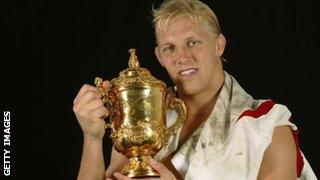
Lewis Moody won the World Cup with England in 2003
Moody, like his father, is named after Lewis Walton Moody, who fought with the Royal Sussex Infantry during World War One and survived.
"When you play a sport, you have no concept of what it would have been like back in 1914," Moody, who was capped 71 times, tells a BBC Radio 5 live documentary, First World War and Sport, on Monday.
"In the last couple of years of my career, I found it quite hard to get up for some games when we weren't playing internationals in terms of getting mentally prepared to get the same sort of emotional level that I'd had in previous years.
"I actually used to take my great grandfather's Star and Victory medal and hold them in my hand prior to a game and use them as a way of mentally focusing myself and trying to get myself ready for a game."
Rugby's casualties of war |
|---|
Sixty players represented London Scottish in their four teams' final matches before the war - 45 of them died in action. Scotland lost 30 full internationals in the conflict. |
Moody has long harboured an interest in military history and was particularly moved by a visit to wartime graves during the 2007 World Cup in France.
He said the "harrowing" book Somme Mud, written by an Australian private, holds particular resonance for him.
"My great grandfather was wounded and able to return, but so many didn't. They paid the ultimate sacrifice," said Moody.
"So many like Edgar Mobbs and Walter Tull weren't found and their graves cannot be visited. They are just a name on a memorial. They gave so much of themselves so we can enjoy the lives we lead now."
Listen to BBC Radio 5 live's First World War and Sport., external
- Attribution
- Published4 August 2014

- Attribution
- Published5 August 2014
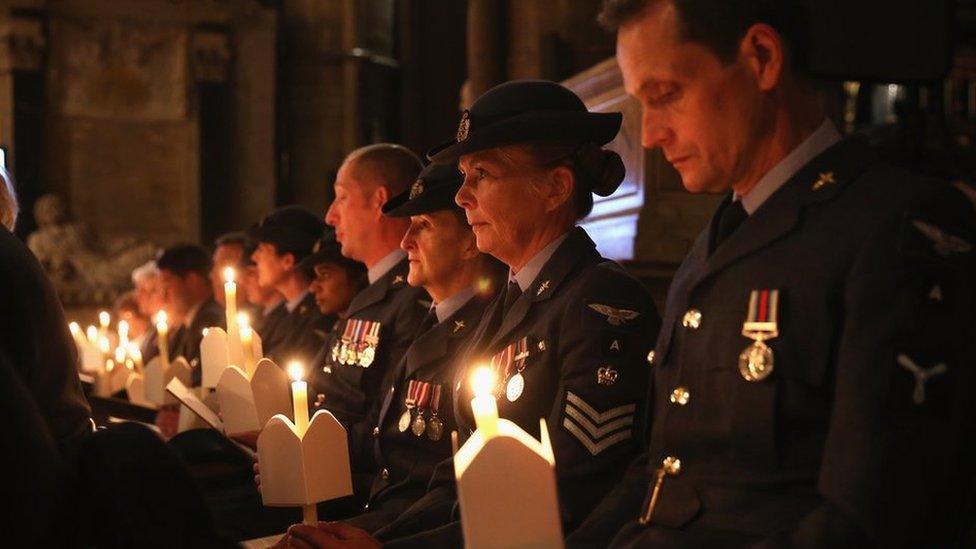
- Attribution
- Published9 May 2014
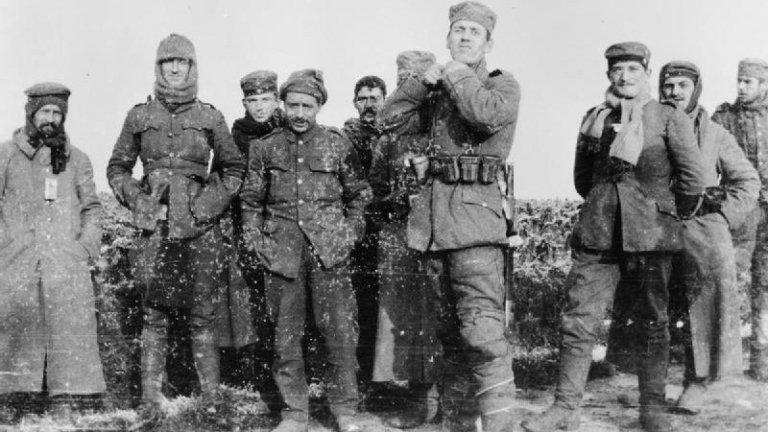
- Attribution
- Published1 August 2014
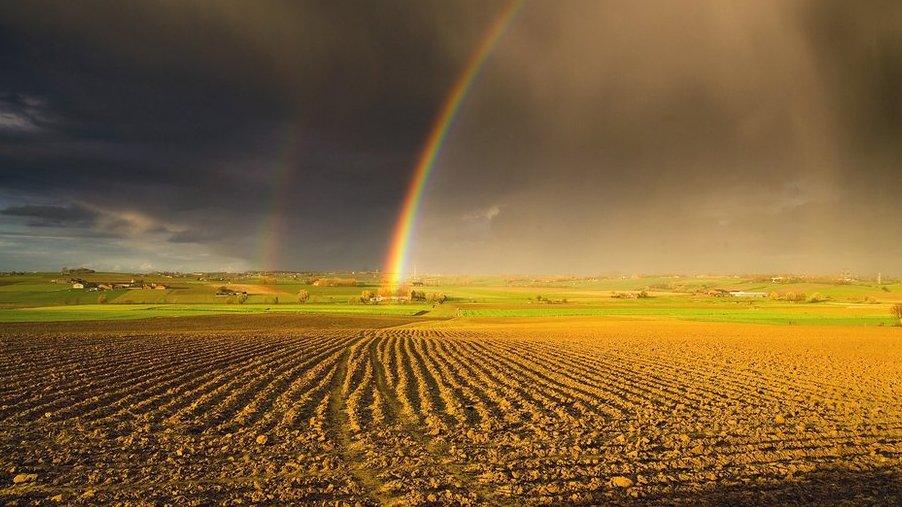
- Attribution
- Published3 August 2014
